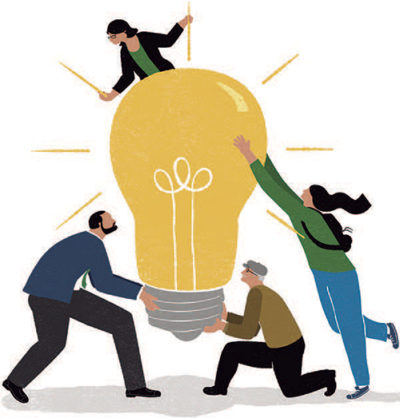Family entrepreneurship is about more than a family’s current business, says Lauri Union, executive director of Babson’s Institute for Family Entrepreneurship (IFE), a recently launched hub dedicated to education, research, and innovative programs that will advance entrepreneurial families and their initiatives. “It’s about the family’s legacy and about how the family’s entrepreneurship evolves over time,” she says.

Illustration: Martin Elfman
To help guide these families in their endeavors, the IFE is introducing the Family Entrepreneurship Amplifier program this fall. “When you think about amplifying entrepreneurship as it passes from generation to generation, there can be gaps and missed opportunities,” says Union, who successfully managed the turnaround and sale of her own family’s business, Union Corrugating. “Our students often are coming in with a really different perspective from their parents, and their Babson experience is leading them to think about entrepreneurship and themselves in a very different way. When they return to the family business, there can be a gap between the child who left and the person who comes back.”
To close that gap, the program engages students and their families together in coursework focused on family business and entrepreneurship throughout the students’ four years at Babson. Each year, students who are accepted into the program will earn four credits (two for each semester). At least one leader from the family business also will take part. “The family has to want to be involved,” Union says, “by speaking with their child on a regular basis and by being on campus at least once during the year.”
Plans for the course include first asking students to investigate and develop a perspective on the past, present, and future state of their family’s entrepreneurship practice in relation to the business, the family, and the student’s personal goals. Coursework will include interviewing family members and nonrelated employees. “It’s hard to build on something if you don’t know what it is to start or what its value is,” Union says. “This also helps students transition from being a child to talking with managers in the business.”
Parents also need to learn how to work with their children, notes Union. “It’s a little bit of a shift in the relationship, seeing the child as a businessperson,” she says. “The entrepreneurial vision that the older generation has may be different from the student’s. So there’s an opportunity to align those visions. Then the family can best leverage the talents and aspirations of everyone.”
Currently, the program is in a design and test phase, so the initial cohort will include 10 students from a mix of class years, and participants will be asked for feedback. Going forward, there will be grade-specific cohorts, one for each class year, with 40 students eventually involved. Because the cohorts will move through their years together, says Union, they can learn from one another, both students and families. “The best outcome will be for cohorts to develop trusting relationships where they can talk openly with each other,” she says, “and, ideally, carry those relationships out of Babson.”—Donna Coco
To learn more about the Institute for Family Entrepreneurship, visit www.babson.edu/ife.
